As Ansu Fati walked off the pitch in the 61st minute in last weekend's La Liga clash against Valencia at the Camp Nou, his eyes spoke a thousand words with dejection clearly visible on his face.
Just a few minutes back, Fati had hit the post with a ferocious strike at the near post that almost hoodwinked Valencia goalie Giorgi Mamardashvili. He is trying hard to make an impact, perhaps too hard, and his body language is that of a player whose confidence is shaken to the core.
It is not uncommon for athletes to go through a rough patch, especially when he is contracted to one of the grandest sporting institutions on the planet and expectations are always high. So Fati’s condition is neither unique nor irreparable.
Here's a look at his journey:
The Beginning of Ansu Fati, the Record Maker
Those who follow La Liga will know that the 20-year-old Guinea-Bissau forward burst onto the scene three years ago as a teenage sensation, quickly becoming known for his pace and instinctive goalscoring ability.
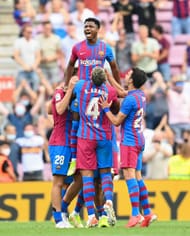
Fati’s list of records even in his fledgling career is already impressive. Not only did he become the second-youngest Barcelona player to debut for the club but he also became the youngest goalscorer for the Catalans at just 16 years 304 days in a game against Osasuna. That also made him the third-youngest goalscorer in La Liga history.
Then, on 14 September 2019, Fati became the youngest player ever in La Liga to both score and provide an assist in the same match, in a 5-2 home win against Valencia.
Fati then took his impressive form to European competitions, becoming the youngest ever goalscorer in the Champions League, scoring a goal in Barcelona’s 2-1 victory against Inter Milan at the San Siro at just 17 years and 40 days. Fati also has the unique record of scoring the 9000th goal in Barcelona’s history, in a 4-1 away victory against Villareal.
At one point, he seemed destined to make a permanent spot in the Blaugrana starting eleven. Under manager Ernesto Valverde, who had immense faith in the young forward, he was almost unstoppable.
The injury woes of Ansu Fati
Anyone who reads the list of records above will be forgiven for thinking that Fati will never have any shortage of confidence, almost as if he was born to create and break milestones.
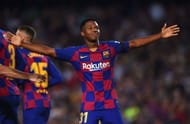
Perhaps that would have been the case, had it not been for an inner meniscus (knee) injury he suffered on 7 November 2020 in a game against Real Betis. By this time, Valverde had been replaced by the ill-fated Quique Setien, whose biggest contribution to Barcelona was perhaps the permanent promotion of Ansu Fati to the first team.
The injury and the way it was dealt with at the time had seismic repercussions for Fati, who is now paying the price for that. He returned to Barcelona after undergoing surgery by Dr. Ramon Cugat, a specialist who has used the knife on footballers such as Xavi, Carles Puyol, Fernando Torres and more. The doctor had expressly told Fati that he was to have one recovery session per day to get his knee back in normal condition. Fati returned to the club ten days later.
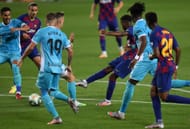
However, the problems began when the Barcelona physios started having two recovery sessions for Fati instead of the one advised by Dr. Cugat. This continued until Fati realised that his knee had begun to swell. He returned to Dr. Cugat and had to undergo another surgery after just two months, which was another suture.
Although he was scheduled to return to action on the spring of 2021, he had to undergo another operation, a third time in four months. Then again, after another two months, he had to undergo a meniscectomy, where the damaged part of Fati’s meniscus had to be removed. It was his fourth operation in six months on the same knee.
After so many operations, any player would have to be a little traumatized from the operating theatre. But Fati returned to match-fitness and made his comeback on 26 September 2021, even scoring a goal in a 3-0 win against Levante. It looked like he had come back to his former self after all.
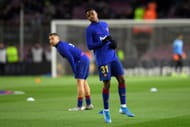
Fati would go on on to play six more games without any issues, until he suffered an injury against Celta Vigo. It was an injury in the biceps femoris on his left thigh, which meant two more months out of football. But he once again returned to action in the Supercopa de Espana semi-final against Real Madrid in January 2022 and took just 17 minutes to score a goal.
However, it was almost as if Fati had been cursed somehow. Later that month, in a league game against Athletic Club Bilbao, he suffered a hamstring injury. By this time, he was almost nauseous by the prospect of surgery. The club asked him to go through yet another operation, but Fati declined and decided to undertake a more conventional approach.
The physiotherapist Lluis Puig has hypothesized that one of the reasons why Fati had recurring injuries was the fact that he had been trying to compensate with his other non-operated leg, putting most of his body-weight on that leg.
Thus, he was trying to ease the burden on the leg on which he had already had four surgeries in six months. Thus, he not only lost his speed, but also had to undergo the psychological burden of ‘what if’ he injured that leg once again.
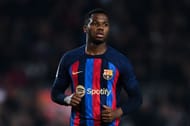
Also, it has to be mentioned that Fati has now been replaced as the club’s most valuable young player by Pedri and fellow midfielder Gavi, who comes a close second. Thus, Fati has now slid down the pecking order in terms of importance to Barcelona. Fati’s pressure was compounded when he was handed Lionel Messi’s number 10 shirt.
The key to Fati being back to his former self is to believe that he can bounce back without injuring the fragile meniscus once again. After all, playing with a psychological burden is not doing his game any good. He now fears sprinting and has even become a less-potent finisher when chances do come his way.
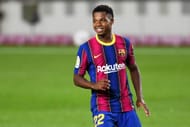
To be fair to him, any other player in Fati’s shoes would have been similarly affected. It is never easy to recover from one surgery, but to have four surgeries performed in six months on the same place is indeed traumatizing.
Fati is still just 20 years old and has a very promising career ahead of him. The only stumbling block could be Barcelona’s patience in allowing the player time to regain his lost confidence.
Fati needs more support from his teammates
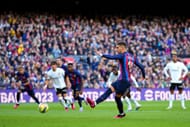
We have also seen how less assertive he has become in recent weeks because of his wavering form. In the match against Valencia, Fati wanted to take the penalty that would have made the match 2-0 but instead Ferran Torres, who himself is yet to fully become integrated into the squad, nudged Fati off and took the penalty and missed.
This shows that Fati is even below Torres in the pecking order, not only in terms of penalty-kick duties but also in terms of confidence. It is also worth mentioning that Ferran Torres is a direct positional rival to Fati who are both wingers even if Torres can play on either flank.
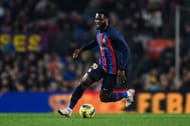
We have also seen Fati's lack of coordination in recent weeks after he blocked Frank Kessie’s effort in the 72nd minute in the Copa del Rey semi-final against Real Madrid, a goal that would have made it 2-0 to Barcelona before the second leg in the Nou Camp on 5 April. Fati was unable to sort out his feet in time and ended up coming in between a certain goal for Barcelona.
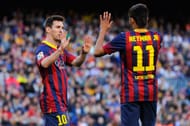
Barcelona fans will remember the days of Lionel Messi and Philippe Coutinho when the former would let the Brazilian take a spot kick to get his confidence back. Messi was also known to give penalty kicks to Luis Suarez and even Neymar in order for his other teammates to score and get back on a goalscoring run.
Interestingly enough, if Messi does indeed return to the Nou Camp, it has been reported that he would like to see Ansu Fati being sold to some other club. That is because Fati was once represented by the agent Rodrigo Messi, the elder brother of Lionel Messi. In 2020 however, Fati replaced Rodrigo with Cristiano Ronaldo's former agent Jorge Mendes. If a Forbes report is to be believed, Lionel Messi feels that Fati 'betrayed' his family.
Xavi must give Fati time to regain his confidence
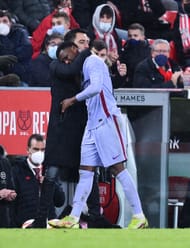
In a way, Fati feels cornered. He needs to break free of his mental shackles and play with freedom. Only the club and manager Xavi Hernandez can get him back on track. However, Xavi’s words would not fill the player with much confidence. He said:
“It’s good to show ambition, desire and responsibility of wanting to shoot. But we have an order [of penalty taking]…Ferran was top of the list. The staff decided and the players knew that.”
Fati’s desire to take the penalty was misplaced and out of order as per Xavi’s statement even if he showed ‘responsibility’. Perhaps it would have been more helpful for Fati’s confidence to have let the player break the order and take the kick and score a goal.
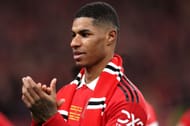
Will Fati become the player he was expected to at the time when he burst on to the scene? Only time will tell. We know that athletes are capable of doing that.
We have seen how Marcus Rashford has found his touch back and is enjoying a resurgence in form and is scoring goals at will in recent weeks. We can only hope that Fati will do something similar.
